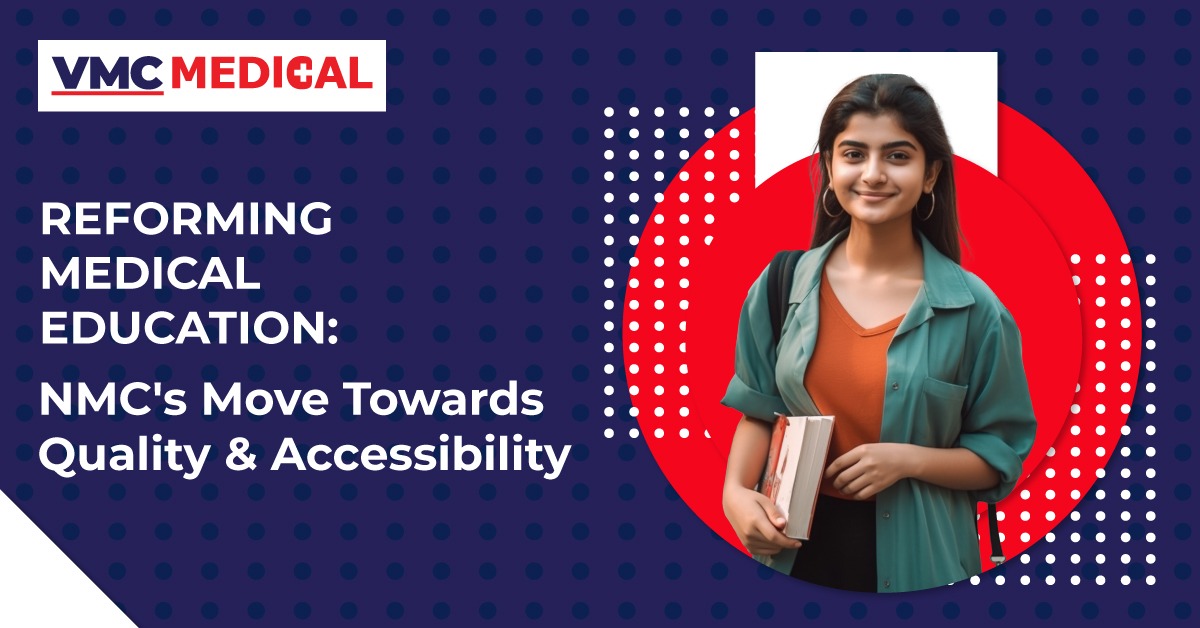Reforming Medical Education: NMC’s Move Towards Quality and Accessibility
 Posted On
Posted On
75 total views, 1 views today
In a significant stride towards enhancing medical education standards and ensuring better accessibility to healthcare facilities, the National Medical Commission (NMC) has introduced comprehensive guidelines for the establishment and functioning of medical colleges. One of the pivotal changes involves a reduction in batch sizes from a maximum of 250 to a range of 50 to 150 students for the academic year 2024-25.
Previously, the overcrowded classrooms and limited practical exposure in MBBS programs prompted the NMC to reassess the situation. Under the Undergraduate-Minimum Standards Regulations (UG-MSR) 2023, a new directive was set forth, stipulating a ratio of 100 MBBS seats for every 10 lakh population in states/UTs. By limiting the number of MBBS seats to 150 per college and enforcing a maximum of 100 seats per 10 lakh population, the NMC aims to mitigate the clustering of hospitals in certain areas.
Outlined in the guidelines issued on August 16, 2023, colleges seeking to augment their seat count must adhere to stringent criteria. They must demonstrate compliance with all prerequisites for seat admissions from the preceding academic year and fulfill the necessary requirements for expanding seat capacity.
However, the reforms transcend mere numerical adjustments. Emphasizing quality and accessibility, the UGMSR 2023 mandates that new medical colleges must integrate functional hospitals with a minimum bed capacity to facilitate practical training for students. Additionally, the introduction of annual renewals ensures ongoing adherence to quality standards by colleges throughout their operational tenure.
These guidelines extend to all medical colleges or institutions under the purview of the National Medical Commission (NMC), including those intending to establish new facilities or increase seat capacities for the academic session commencing in 2024-25. Only those medical colleges that already exist and meet the specified conditions will be able to continue accepting students with the authorized/recognized number of MBBS seats from the 2024–2025 academic year.
The move towards reducing batch sizes is a strategic step aimed at fostering a conducive learning environment for medical students. By curbing overcrowding, institutions can focus more on individualized attention, ensuring better academic outcomes and comprehensive practical training. Moreover, it facilitates a more equitable distribution of healthcare resources, preventing the concentration of medical facilities in densely populated areas.
Furthermore, the emphasis on integrating functional hospitals within medical college premises is a testament to the importance of hands-on experience in medical education. Students require practical exposure to diverse medical scenarios to develop the skills necessary for their future roles as healthcare professionals. Through this initiative, the NMC endeavors to bridge the gap between theoretical knowledge and practical application, thus producing competent and well-rounded medical practitioners.
The annual renewal requirement serves as a mechanism for continuous quality assessment and improvement. Colleges must consistently meet predefined standards to retain their accreditation, ensuring accountability and fostering a culture of excellence within the medical education landscape. This proactive approach to monitoring and evaluation reflects the NMC’s commitment to upholding the highest standards of education and healthcare delivery.
Final Thoughts
In conclusion, the NMC’s decision to reduce batch sizes and implement stringent guidelines signifies a paradigm shift towards prioritizing quality and accessibility in medical education. By aligning seat allocations with population demographics and emphasizing practical training alongside theoretical learning, these reforms promise to elevate the standard of medical education in the country. As stakeholders collaborate to implement these changes, the future of healthcare education in India appears poised for positive transformation, with implications extending far beyond the confines of academic institutions.




